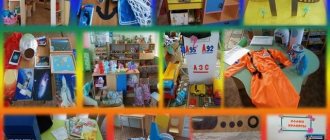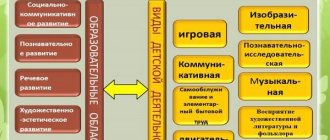The state of play activity of modern preschoolers
The features of the play of modern preschoolers were studied in the work of E. O. Smirnova and O. V. Gudarev “Play and voluntariness in modern preschoolers.” Based on the levels identified by D.B. Elkonin, the authors tried to evaluate the content of the play of modern children of three age groups: middle (from 4-5 years old), older (5-6 years old) and preparatory (from 6-7 years old). At a specially designated time, a small group of children (four to five people) was invited to play any game in a familiar kindergarten room. Each child's type of play activity was assigned to one of the levels of play and categorized as an action role, a story role, and a relational role.
The results of observations showed that the majority of modern children aged 4-6 years reduced the game to simple, uncomplicated actions and individual remarks addressed to a partner. The highest stage of play development, when role relationships are clearly expressed and the child’s behavior is connected with partners (play relationships), occurs only in some children after 5 years.
The next question that was investigated in this work is: how does a decrease in the level of play affect the formation of one of the most important new formations of preschool age - arbitrariness.
The work of Z. Manuylenko (1948) [2] is often cited as proof of the leading role of play in the formation of voluntariness. In this work, the indicator of volitional behavior was the time of maintaining a posture of immobility demonstrated in the game (when performing the role of a guard) and outside the game (at the request of an adult). The results showed that during the heyday of role-playing games (age 4-5 years), the time to maintain a pose in a game was more than three times higher than the same indicator in a non-play situation. At the age of 6-7 years, these indicators converge due to the rapid growth of non-playing volitional qualities, and the time to maintain a pose in play and non-play situations is almost comparable.
In this work, the playing role acts as an external means that establishes the zone of next development, which then “rotates” and is internalized. Thus, voluntariness is transformed into a personal ability that does not depend on the current situation.
The experiments described above were carried out in the middle of the last century, when the quantity and quality of gaming activities was much higher. Do these models still exist today? To answer these questions, an experiment was conducted in which the technique of 3. V. Manuylenko was used. In order to bring the plot of the game closer to modern conditions, children were offered not the role of a security guard, but the role of a “security guard protecting the bank from fraudsters.” The essence of the role-playing game has not changed, but the content of the role has become more clear. Otherwise, the experimental situation, the ages studied, the observed indicators and their processing exactly repeated Manuylenko’s studies.
However, the data of preschoolers of the 21st century were radically different from the results of children of the middle of the last century. In Fig. Figure 1.3 shows the dynamics of volitional behavior in and outside of play among preschoolers of two generations. The presented graph clearly demonstrates a number of significant differences in the stage of development and dynamics of volitional behavior.
Firstly, modern preschoolers have significantly lower absolute indicators of volitional behavior. Even in the preparatory group, our children cannot hold a pose for more than 3 minutes, while their peers of the previous generation could hold a motionless pose for an average of 12 minutes. These differences clearly indicate a decrease in the ability to self-control and manage one's own behavior.






